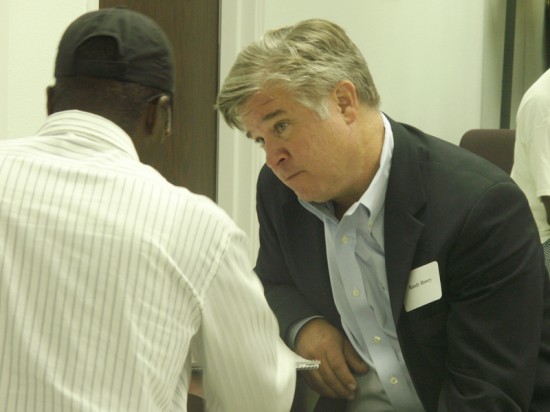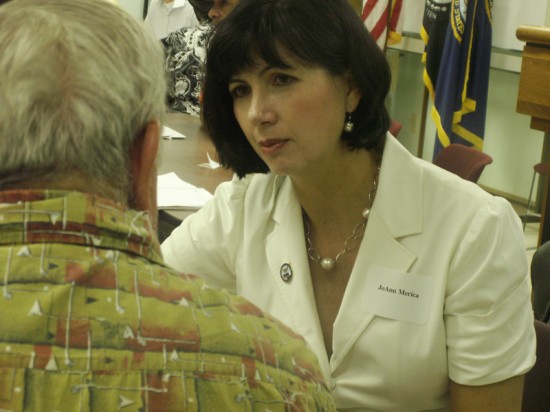United States military operations in Afghanistan and Iraq have been ongoing for more than ten years now. That adds up to a lot of veterans coming home. And a lot of them are coming to Texas, attracted by job opportunities, a low cost of living, and also a high population of fellow veterans. Unfortunately, too many of the men and women who served the U.S. face severe difficulties upon their return to civilian life. According to 2000 U.S. Census data, 1.5 million veterans live below the poverty level, and the numbers have likely increased in the ensuing years. More recently, the Department of Veterans Affairs estimates that 107,000 veterans are homeless on any given night. And that adds up to a massive need for legal assistance among veterans. It’s a need a new organization set up by the State Bar of Texas, Texas Lawyers for Texas Veterans (TLTV), is aiming to meet.
“There have been a lot of disturbing cases,” said Terry Tottenham, ’70, of counsel to Fulbright & Jaworski LLP in Austin and the man who initiated the TLTV program while he served as president of the State Bar of Texas in 2010–2011. “Veterans, by some counts, account for 23 percent of all homeless people in America,” Tottenham said. “They often face delays in receiving their benefits, and face challenges and hurdles like divorce, bankruptcy, landlord and tenant issues, employment and tax questions, wills and estate planning, and lots more. We saw that the Houston Bar Association was doing good pro bono work assisting veterans in the Houston area, and we thought we should try to expand the program to serve veterans all over the state.”

Randy Howry, an Austin attorney and lecturer with the Law School’s Trial Advocacy Program, participates in an April TLTV legal clinic for veterans in Austin. The TLTV initiative has drawn many UT Law alumni and friends to help carry out pro bono work on behalf of U.S. veterans.
TLTV provides enough comprehensive information and resources for any local bar association to set up a free legal clinic for veterans. In larger cities like Houston and Dallas, clinics are offered weekly, while in smaller cities and communities they occur monthly or even less frequently. The TLTV provides not only legal information for all clinics, but step-by-step plans for clinic organizers on organizing and publicizing a clinic. “We call it a ‘clinic in a box,’” Tottenham said.
Still, it can be hard to reach veterans in need of legal assistance. “Getting the word out is one of the biggest challenges,” Tottenham said, citing the fact that many of the veterans most in need of assistance are either homeless or transient. “The local bar associations partner with the nearest VA medical centers and outpatient clinics, since that’s where most vets go for medical care. Otherwise, there’s a lot of dropping off of flyers at homeless centers, churches, and other organizations. Each local area determines their own best way to reach veterans in need.”

Jo Ann Merica, ’84, a partner at Merica & Bourland PC, consults with a veteran at a TLTV legal clinic for veterans in Austin in April
Most commonly, veterans’ legal concerns deal with divorce, bank problems, probate, real estate, and veteran’s benefits issues. But, Tottenham said, clinics address a much broader array of needs because veterans’ legal issues are as broad as the general populations. This makes it important to draw from a wide variety of attorneys with different legal specialties.
That’s a lesson that Karen Monsen, ’00, a labor and employment attorney at Jackson Walker LLP’s San Antonio office, learned when she began volunteering at the San Antonio TLTV clinic, which is held monthly at a local VA hospital. “Attorneys of all different practices need to show up, because the veterans’ needs are many and diverse,” Monsen said. “I was the only employment lawyer at the clinic when I first showed up, and I ended up being paired with a man in great need of help in that area.”
The man Monsen met was Everette Hughes, a U.S. Navy veteran who had been living at a San Antonio shelter for homeless veterans, the American GI Forum, and who had been laid off from his job as a truck driver, denied unemployment benefits by the Texas Workforce Commission (TWC), and had also been ordered by the TWC to pay back the benefits he had already received. Because he was homeless and hoping to take classes that would give him certification to work as an armed security guard, Hughes had decided to stop pursuing legal action against the TWC. Monsen, with the assistance of her firm colleague, Marc Whyte, agreed to help Hughes pursue his case pro bono.
The TWC had already decided two cases against Hughes, and were denying him further hearings because he had missed an appeal date. “The TWC was sending him harassing collection letters almost weekly and we really didn’t think we could win at first,” Monsen said. “The odds were really not in his favor.” Monsen and Whyte filed an open records request on behalf of Hughes to access the transcripts from his previous hearings. They then wrote a brief to the TWC asserting that their decisions had been wrong and that Hughes should get a new hearing. Much to their surprise, the TWC agreed. The agency gave Hughes what they owed him, admitting that they had erred.
“Everette is a great guy,” Monsen said, “and it was great to see him get a victory after struggling so long.” Indeed the experience seems to have affected Monsen deeply. “You handle one case like that, and you can’t forget about the people you work with. I say Everette’s name at Jackson Walker and people rush to help him. He’s still struggling to get back on his feet, but I’m not going to abandon him. I hope other lawyers will get involved in this work. These people have done so much for us, and we have to give them all our support.”
Travis Sales, ’87, a partner at Baker Botts LLP in Houston, has had a similar experience. “My colleague Louie Layrisson and I had the privilege of representing a young man who had been in the 101st Airborne and had been deployed in Iraq on multiple missions,” Sales said. “After many jumps with heavy equipment both in training and on missions, the soldier developed lower back disc bulges and nerve damage radiating pain and weakness to both legs. After honorable discharge, he was awarded a 20 percent disability rating for his back and injury and radiating pain to one leg, but was denied disability for the other leg. After his service, the veteran worked in construction and but was physically limited. His career prospects were limited because he could no longer perform heavy labor or work for sustained periods of time due to his injuries. Working through the TLTV and the Houston Volunteer Lawyers Program, we took his appeal of the additional 10 percent denial on a pro bono basis. We enlisted the help of a pro bono neurologist, who himself had been in the service, who reviewed the medical records and history and provided an expert affidavit. On appeal, the Board of Veterans Appeals overturned the VA’s denial and increased his disability rating by 10 percent to reflect the disability to his other leg—30 percent total. As a result of the award, he received back pay benefits of approximately $10,000 dating back to his original claim in 2005. And the award provides important additional benefits, which he is using to change his career path through a college degree and to help with other life adjustments. The veteran is thrilled and very thankful for the assistance, as his own efforts on his claim had been totally unsuccessful. Helping one of our veterans to obtain these important benefits was one of the best experiences I’ve had practicing law.”
Tottenham said he hoped stories like Monsen’s and Sales’s and their clients’ will become increasingly common. Already many Law School alumni, students, and instructors have helped organize and taken part in TLTV clinics, including Allan Dubois, ’70, (Law Offices of Allan Dubois PC, San Antonio); Jo Ann Merica, ’84, (Merica & Bourland PC, Austin); Randy Howry, a lecturer in the Law School’s Trial Advocacy Program (Howry, Breen & Herman, Austin); and Don Williams, ’75, (Law Offices of Donald L. Williams, El Paso). The response to the TLTV initiative has been positive, with local bar associations setting up clinics not just in big cities like San Antonio, but in small rural communities and near military bases—including Ft. Bliss, near El Paso, and Ft. Hood, near Killeen—throughout the state. Recently, other state bar associations have created similar initiatives. Tottenham said the number of states with similar programs is now at least fourteen, and he hoped it would spread to all fifty states. “It can be easily transported anywhere,” Tottenham said. “It’s a clinic in a box and a really easy thing to copy. Once lawyers participate in this clinic, they become energized. It’s very fulfilling work, and I hope it will expand greatly the number of lawyers doing pro bono work. There’s a real need out there. There are people out there who have sacrificed so much for our country and who are now suffering, and we as lawyers have a hands on ability to help.”
—Julien N. Devereux
